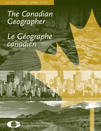
CANADIAN GEOGRAPHIES-GEOGRAPHIES CANADIENNES
Scope & Guideline
Charting New Territories in Canadian Research
Introduction
Aims and Scopes
- Social and Environmental Justice:
The journal consistently addresses themes of social justice, environmental justice, and the impacts of colonialism and systemic inequalities, focusing on how geography shapes and is shaped by these issues. - Urban and Rural Dynamics:
Research in this journal explores the complexities of urbanization and rural development in Canada, examining how factors such as immigration, housing, and local economies influence community resilience and identity. - Indigenous Geographies:
A significant emphasis on Indigenous perspectives and issues, including land rights, health, and environmental stewardship, reflects the journal's commitment to decolonial approaches in geography. - Climate Change and Sustainability:
The journal places a strong focus on climate change, sustainability, and environmental adaptation strategies, particularly in the Canadian context, highlighting local responses to global challenges. - Digital Geographies and Technological Impacts:
The integration of technology in geographical research is a growing area, with studies exploring digital geographies, smart cities, and the implications of technology on social interactions and urban planning.
Trending and Emerging
- Climate Justice and Resilience:
There is an increasing focus on climate justice, examining how marginalized communities are disproportionately affected by climate change, and exploring strategies for building resilience in these communities. - Intersectionality in Geography:
Emerging themes around intersectionality, particularly regarding race, gender, and socio-economic status, are gaining traction as researchers strive to understand the multifaceted nature of geographical issues. - Community and Participatory Research:
A trend towards participatory research methodologies is evident, emphasizing the importance of community engagement and local knowledge in geographical research and planning. - Health Geographies:
The rise of health geographies, particularly in relation to the COVID-19 pandemic, is notable, with research focusing on the spatial dimensions of health disparities and access to healthcare resources. - Technological Impacts on Society:
The exploration of how technology reshapes social interactions, urban environments, and geographical practices is increasingly prominent, reflecting the significance of digital transformations in contemporary society.
Declining or Waning
- Traditional Economic Geography:
Research focusing solely on traditional economic geography, such as industrial location and resource allocation, has seen a decline, possibly due to a shift towards more interdisciplinary and socially conscious approaches. - Purely Theoretical Geographical Models:
There has been a noticeable reduction in the publication of papers that emphasize purely theoretical models without empirical grounding, as the journal increasingly values applied research that addresses real-world issues. - Historical Geography:
While historical perspectives remain important, there appears to be a waning interest in studies that do not connect historical insights with contemporary geographical issues, reflecting a trend towards relevance in current debates. - Conventional Urban Planning:
The focus on traditional urban planning paradigms is less frequent, as the journal gravitates towards innovative and participatory approaches that incorporate community engagement and social equity. - Environmental Determinism:
Research that leans towards environmental determinism, which suggests that the environment solely shapes human behavior and societal outcomes, is becoming less favored in favor of more nuanced, reciprocal relationships between society and environment.
Similar Journals

Present Environment and Sustainable Development
Exploring the nexus of ecology, policy, and socio-economics.Present Environment and Sustainable Development, published by ALEXANDRU IOAN CUZA UNIVERSITY PRESS, is a prominent open-access journal dedicated to advancing knowledge in the field of environmental science and sustainable development. Since its inception in 2014, the journal has provided a platform for researchers, professionals, and students to disseminate transformative ideas and innovative research aimed at addressing crucial environmental challenges. With its ISSN 1843-5971 and E-ISSN 2284-7820, it emphasizes the necessity of sustainable practices in contemporary society, facilitating interdisciplinary approaches that unite various fields, including ecology, policy, and socio-economic studies. Based in Iasi, Romania, this journal plays a vital role in fostering international collaboration and dialogue on sustainability, making it an essential resource for anyone committed to understanding and improving the environment for future generations.

Journal of Geography-Cografya Dergisi
Navigating Contemporary Geographical ChallengesJournal of Geography-Cografya Dergisi, with ISSN 1302-7212 and E-ISSN 1305-2128, is an esteemed publication in the field of geography, dedicated to advancing scholarly research and knowledge in this vital discipline. Published by the Faculté des Lettres, Department of Geography at Istanbul University, this journal has embraced an Open Access policy since 2017, ensuring that cutting-edge research is freely accessible to a global audience, thereby fostering interdisciplinary collaboration and widening the dissemination of geographical studies. The journal aims to publish high-quality research articles, reviews, and case studies that address contemporary geographical challenges, methods, and innovations, appealing to researchers, professionals, and students alike. With its strategic location in Istanbul, a city that exemplifies a rich tapestry of geographical phenomena, the journal holds a vital role in connecting scholars with the diverse landscapes and cultural experiences that shape our understanding of geography. Join the vibrant community of geography enthusiasts and contribute to the ongoing dialogue within this dynamic field.

MITTEILUNGEN DER OSTERREICHISCHEN GEOGRAPHISCHEN GESELLSCHAFT
Charting New Territories in Geographical ResearchMITTEILUNGEN DER OSTERREICHISCHEN GEOGRAPHISCHEN GESELLSCHAFT, published by the Österreichische Geographische Gesellschaft, serves as a vital resource within the fields of Geography and Earth-Surface Processes. This journal, with the ISSN 0029-9138, offers a platform for scholarly articles that contribute to the understanding of geographical phenomena, particularly focusing on regional and environmental issues based in Austria since its establishment. Although lacking Open Access options, the journal maintains rigorous publication standards and has seen converged issues from 1978 to 2008, and from 2011 to 2018, alongside recent volumes from 2020 to 2023. As a Q4 ranked journal in the Scopus categories for Geography, Planning and Development, and Earth-Surface Processes, it is strategically positioned to support researchers, professionals, and students striving to enhance geographical knowledge. As such, MITTEILUNGEN DER OSTERREICHISCHEN GEOGRAPHISCHEN GESELLSCHAFT continues to foster geographical discourse and innovation, contributing significantly to the academic community.

Territorios
Connecting Perspectives in Geography and Urban StudiesTerritorios, an esteemed Open Access journal published by UNIV ROSARIO in Colombia since 1999, serves as a critical platform for the dissemination of knowledge in the fields of Geography, Urban Studies, and Development Planning. With an ISSN of 0123-8418 and an E-ISSN of 2215-7484, the journal has been recognized for its commitment to promoting rigorous research and innovative practices within its scope. In the 2023 evaluation, it achieved notable rankings, placing in the Q4 category in Geography, Planning and Development, and Q3 in Urban Studies, reflecting its growing impact in the social sciences. Although currently positioned in the lower percentiles, the journal plays an important role in amplifying diverse voices and perspectives, encouraging scholarly dialogue in an ever-evolving urban landscape. The address of the journal's home is found at PROGRAMA PSICOLOGIA, FAC MED, CARRERA 24 63 C-69 QUINTA DE MUTIS, BOGOTA, COLOMBIA. Researchers, professionals, and students seeking a comprehensive understanding of contemporary geographical issues and urban development trends will find Territorios to be an invaluable resource.
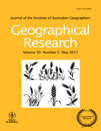
Geographical Research
Connecting Ideas Across Geographical BoundariesGeographical Research, published by WILEY, is a premier academic journal based in the United Kingdom, dedicated to advancing knowledge in the fields of Geography, Planning, and Earth-Surface Processes. With an impact factor that reflects its high academic caliber, this journal ranks in the Q2 category for Earth-Surface Processes and Q1 in Geography, Planning and Development, highlighting its influential role in shaping contemporary research within these disciplines. The journal's Scopus rankings further underscore its significance, standing at #175 out of 821 in Geography, and #41 out of 179 in Earth-Surface Processes, placing it within the top 78th and 77th percentiles, respectively. Since its inception in 2005, Geographical Research has continuously provided a vital platform for scholars to disseminate innovative research, fostering dialogue and collaboration across disciplines. Although currently not open access, its content remains indispensable for researchers, professionals, and students aiming to deepen their understanding of geographical phenomena and develop strategic insights for planning and development.
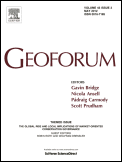
GEOFORUM
Unraveling Socio-Political Phenomena with Scholarly RigorGEOFORUM, a distinguished academic journal published by PERGAMON-ELSEVIER SCIENCE LTD, stands as a leading platform for scholarly discourse in the fields of Sociology and Political Science. Established in 1970 and currently extending its reach until 2024, the journal is recognized for its significant contribution to understanding complex socio-political phenomena on a global scale. With an impressive Q1 category ranking in the 2023 Scopus Quartile and an exemplary 94th percentile ranking among its peers, GEOFORUM positions itself as a vital resource for researchers, professionals, and students alike. The journal, while following a traditional access model, remains essential for disseminating impactful research that addresses contemporary socio-political issues. It not only enriches academic knowledge but also serves as a cornerstone for policy-making and sociological inquiry, making it a must-read for anyone invested in the humanities and social science fields.
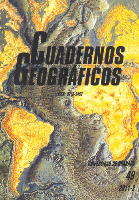
Cuadernos Geograficos
Pioneering research in geography and earth sciences.Cuadernos Geograficos is a distinguished open access journal published by UNIV GRANADA in Spain, dedicated to advancing the fields of geography, planning, and earth-surface processes. With an ISSN of 0210-5462 and E-ISSN 2340-0129, this journal has been serving as an essential platform for scholars since its inception in 1983. By providing rigorous peer-reviewed research, Cuadernos Geograficos contributes significantly to the academic discourse within these disciplines, holding a respectable position in the Q3 category for both Earth-Surface Processes and Geography, Planning, and Development as of 2023. The journal is indexed in Scopus, ranking #431/821 in Social Sciences and #100/179 in Earth and Planetary Sciences, affirming its relevance and impact within the scholarly community. With its commitment to open access since 1999, Cuadernos Geograficos ensures that vital research is accessible to a diverse audience of researchers, professionals, and students, fostering knowledge sharing and collaborative advancements in the geographical sciences.

Entorno Geografico
Innovating Solutions for Environmental ChallengesEntorno Geográfico is a premier open-access journal published by University of Valle, dedicated to the field of geography and environmental studies. Since its inception in 2002, this journal has provided a dynamic platform for researchers, professionals, and students to disseminate innovative findings and engage in critical discussions regarding geographical phenomena and environmental challenges. With an ISSN of 1692-0074 and an E-ISSN of 2382-3518, it is recognized for its commitment to high-quality peer-reviewed content that reflects cutting-edge research trends within the discipline. The journal aims to enhance understanding of socio-environmental processes and contribute to the formulation of sustainable solutions to pressing geographical issues. By fostering an open-access model, Entorno Geográfico ensures that valuable knowledge is widely accessible, encouraging collaboration and advancing education in the field. Located in Cali, Colombia, the journal reflects a strong regional focus while embracing a global perspective, making it an essential resource for the international geography community.
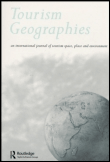
Tourism Geographies
Navigating the Complexities of Tourism and GeographyTourism Geographies is a leading academic journal published by ROUTLEDGE JOURNALS, TAYLOR & FRANCIS LTD, specializing in the diverse and dynamic field of tourism studies. With a Focus on the intersections of geography, planning, and development, this journal has established itself as an authoritative source for innovative research and insights since its inception in 1999. The journal not only holds a prestigious Q1 rank in both the categories of Geography, Planning and Development and Tourism, Leisure and Hospitality Management but also boasts remarkable rankings in Scopus, reflecting its impact and relevance in the academic community. With years of knowledge converging till 2024, Tourism Geographies provides critical perspectives and findings that contribute to the sustainable development of tourism practices worldwide. Researchers, professionals, and students engaged in tourism and related fields will find this journal to be an invaluable resource for advancing their understanding and shaping future policies within the industry.

Geografisk Tidsskrift-Danish Journal of Geography
Connecting Scholars Through Innovative Geographic Research.Geografisk Tidsskrift-Danish Journal of Geography, an esteemed publication by the Royal Danish Geographical Society, serves as a pivotal platform for disseminating innovative research in the realms of geography and earth sciences. Established in 1972, the journal has sustained its academic rigor through 2024, achieving Q2 quartile rankings in both Earth and Planetary Sciences and Geography, Planning and Development. With an ISSN of 0016-7223 and E-ISSN 1903-2471, this journal engages a global audience, including researchers, professionals, and students who seek to explore diverse geographical and environmental issues through high-quality research articles. Although currently non-open access, the journal thrives as a vital resource within the academic community, evidenced by its notable Scopus rankings, which place it in the upper percentiles of its respective categories. By providing critical insights into geographical phenomena, Geografisk Tidsskrift plays an integral role in advancing the understanding of complex spatial dynamics and fosters scholarly dialogue among geographers worldwide.